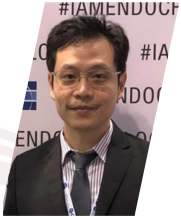
- This event has passed.
DiCE Program 2019 – Thailand (July)
Session Dates:
July 4 – 6
Speakers & Lecture Synopsis
TOPIC 1: THEPTARIN DIABETES STAGING:
A Systematic Individualized Care Plan for People with Diabetes
Ekgaluck Wanothayaroj, MD
Endocrinologist, Theptarin Hospital, Thailand
Each person with diabetes is different. Do we have different standard sets of care for each of them? Diabetes is so complicated; what one measurement can tell how well we do in controlling it? What one tool do we use to communicate the progression of diabetes between healthcare team members as well as person with diabetes and their care takers? Dividing diabetes into different stages has been discussed in the academic world for quite sometimes, but actual implementation in clinical practice has yet to be documented.
Starting more than 10 years ago, diabetes team at Theptarin Hospital has drafted its first “Theptarin Diabetes Staging (TDS)” version. Today, detail of TDS has been updated several times with additional clinical experiences and advancement in new medical knowledge. Today, TDS has turned into the backbone for all multidisciplinary care team members to base their care stands on. Today, quality of diabetes care is measured by monitoring TDS. Maybe, in the near future TDS could have a role in health care financing as well.

EKGALUCK WANOTHAYAROJ, MD
Endocrinologist, BA Med. (Thailand), Board of Internal Medicine (Thailand), Board of Endocrinology (Thailand)
Dr. Ekgaluck received his medical degree from Chulalongkorn University, Thailand in 2002. He completed his training in internal medicine from Khon Kaen University and fellowship in endocrinology from Ramathibodi Hospital, Mahidol University, Thailand in 2009
Dr. Ekgaluck was a lecturer at Khon Kaen University prior to joining Theptarin Hospital in 2011. At Theptarin, he is the leader in the implementation of Theptarin Diabetes Staging into practice for all multidisciplinary team members as well as the implementation of diabetes and cardiovascular screening process for early detection in hospital setting.
Dr.Ekgaluck is currently one of Thailand’s most-invited endocrinologist speakers, a subcommittee member of Thai Association of Diabetes Educator, and a subcommittee of the website of Thai Endocrine Society. He is the recipient of Etzwiler International Scholars 2018 from International Diabetes Center, Minnesota, USA.
TOPIC 2: HOSPITAL UPSIDE DOWN: Driving a Mission to Prevent the Sick in a Place for the Sick
Ms. Tanya Vannapruegs
Associate Director, Theptarin Hospital
Theptarin started from driving for patient education for self-care to control diabetes and prevent complications, a secondary prevention. Starting in 2002 when Diabetes Prevention Program (DPP) Study came out and proved that diabetes can be prevention through lifestyle modification. Since then, Theptarin has expanded its scope of work to cover primary prevention in addition to the original secondary prevention. It is a hospital that challenge the definition of its own identity “hospital”. Who said hospital is only for the sicks? If you do not want to get sick, come to Theptarin “hospital.”

Ms. Tanya Vannapruegs
Hospital Administrator
Ms.Tanya received her bachelor of arts from Tufts University and completed her master in public health and master in business administration from the University of California at Berkeley, USA.
Having grown up and lived in Thailand’s first diabetes center for more than 30 years, attending hospital and academic meetings as well as writing and editing diabetes-related health articles and books, Ms.Tanya has naturally absorbed and understood the importance and progress of how Thailand’s first diabetes multi-disciplinary care team has formed and currently operated.
Ms.Tanya has formally joined Theptarin team for 18 years and is now the associate director in charge of lifestyle for disease prevention mission. Her work includes internal and external communication and involves connecting with government agencies and other health-related sectors such universities, professional associations, and pharmaceutical companies.
Day 1 - Conference Proper
| 8:00AM | Registration |
| 8:30AM | Walk “Diabetes Escape” |
| 9:00AM | Opening Remarks Introduction to Theptarin |
| 9:10AM | Lecture 1 Open Forum |
| 10:30AM | Break – Refreshment |
| 10:40AM | Lecture 2 Open Forum |
| 12:00NN | Lunch |
| 13:00PM | Hospital Tour
|
| 14:30PM | Closing Remarks Awarding of Certificates Group Photo |
| 15:00PM | End of Session |
Hospital

Theptarin Hospital
3850 Rama 4 Rd., Phra Khanong, Bangkok 10110 Thailand
From Clinic to Center of Excellence
Prof. Thep Himathongkam was ahead of his time when he founded Theptarin in 1985, initially as a small clinic. As far back as three decades ago, he had already envisioned a model of holistic therapy for diabetes that aimed to empower patients who suffer from a disease that demands effective treatment and constant monitoring. The Theptarin Diabetes and Thyroid Center was created as a specialist in diabetes and thyroid management. While it opened with all but eight beds for overnight admission, the clinic was huge in its all-encompassing commitment to excellence in service, education for both healthcare professionals and patients, and to research. It was this emphasis on developing a three-pronged expertise that gave life to the first diabetes care team of Thailand which included an endocrinologist, a nurse to educate patients on diabetes, and a dietitian to support proper nutrition.
Seven years later, it evolved into the Theptarin Hospital, acquiring new skills, equipment, and team specialists in order to meet the ever-changing needs of patients. The Hospital began to offer 24-hour services, distal bypass surgery, hyperbaric medicine, and even launched Thailand’s first foot clinic specializing in diabetic foot wound care and prevention.
Because continuous evolution had always been at the core of its quest for excellence, when scientific studies revealed in 2005 that diabetes is a preventable condition, Theptarin Hospital jumped at the opportunity to further enhance its range of therapeutic services. From simply preventing diabetes-related complications, it set up a “Lifestyle Building” to also promote the prevention of diabetes and associated chronic diseases. Subsequently, the Hospital introduced its MEDE Health Solution Club and Weight Management Clinic to advocate healthy daily living, behavior modification, and optimal quality of life for both diabetes patients and the general public.
From a humble clinic with noble dreams, Theptarin Hospital has now become a standout amongst private
hospitals mainly because of its clear focus on developing high quality patient care – from expanded medical teams composed of specialists from diverse branches of healthcare to world-class facilities. Its passion to raise public awareness on diabetes also makes Theptarin Hospital a cut above the rest. The level of excellence achieved by the institution has made it a source of sought-after resource speakers and a training center for students and professionals from local and international healthcare establishments.
In addition, not only was Theptarin Hospital entrusted by the Thai government to train its staff in implementing nationwide behavior modification activities, it was also appointed in 2011 by the World Diabetes Foundation (Denmark) to serve as a center of excellence for training healthcare personnel throughout Southeast Asia. It continues to pursue increased awareness on the early detection and timely risk reduction of diabetes toward the prevention or prolonged onset of this most prevalent disease. Theptarin Hospital has also earned its stripes as the first thyroid center to offer complete diagnosis and treatment, acting as a transfer center for both domestic and international patients.
In 2015, a team of country’s leading cardiologists co-invested to open one of the most comprehensive
cardiology with services ranging from screening through interventions including complicated catheterization, open-heart surgeries, and 24-hour cardiac services. Cardiology team and diabetes team hold academic and service meetings monthly allowing flow of communication and making the care of the two specialties coherent and optimal.
